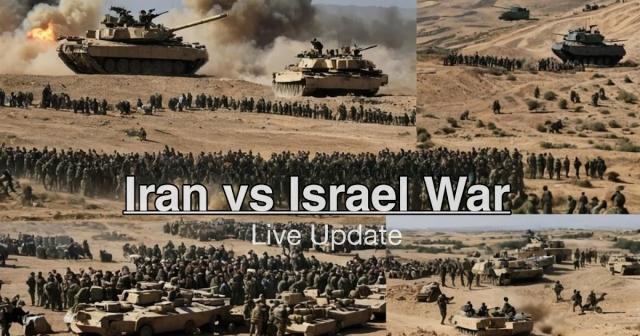This escalating conflict casts a spotlight on the broader implications, including the potential for a wider military confrontation, impacts on global oil prices, and the urgency of international diplomatic efforts to de-escalate tensions. As the Iran-Israel war intensifies, with both sides showing no restraint in their military operations and retaliatory strikes, the international community watches closely. The article aims to delve into the latest developments, the strategic military moves by both Iran and Israel, their impact on the civilians caught in the crossfire, and the calls for peace and stability in a region long plagued by instability and conflict.
The Spark for the Current Escalations
The recent escalations in the Iran-Israel conflict can be traced back to a series of aggressive military actions and retaliations between the two nations. On March 23, 2023, tensions escalated when an Iranian drone, launched from Syria, infiltrated Israeli airspace, leading to an Israeli airstrike on the drone's command center in southern Syria. This incident set off a chain of retaliatory attacks, including Iranian forces launching a barrage of rockets at Israeli military positions in the Golan Heights, which were intercepted by Israel's Iron Dome missile defense system.
The situation intensified on April 14, 2024, when Iran launched over 300 drones and missiles at Israel. This massive assault was largely thwarted by Israel’s aerial defense systems, with additional intercepts by military forces from the United States, France, Britain, and Jordan. This attack was reportedly in response to a suspected Israeli strike on the Iranian Embassy compound in Damascus on April 1, which resulted in the deaths of two Iranian brigadier generals.
In a further escalation, Israel conducted an airstrike inside Iran on April 19, 2024. This aggressive move was intended as a clear signal to Iran that Israel has the capability to strike targets within Iranian territory. The airstrike was a direct response to the earlier Iranian attacks on Israeli soil, which included the barrage of drones and missiles. Despite the severe nature of these military actions, there were no immediate reports of damage or casualties from the Israeli strike. These incidents highlight the fragile and volatile nature of the security environment in the region, underscoring the potential for further escalation and conflict.
Iran's Strategic Military Operations Against Israel
Overview of Iran's Military Response
- Activation of Air Defenses: Following the escalation of tensions, Iran activated its air defenses across several provinces, successfully intercepting a number of small drones.
- Massive Missile and Drone Assault: In a significant escalation on April 12-13, 2024, Iran launched a comprehensive attack involving over 300 airborne weapons against Israel. This included a mix of over 110 medium-range ballistic missiles, more than 30 land-attack cruise missiles, and over 150 uncrewed aerial vehicles (UAVs), marking the first direct Iranian attack on Israel.
- Information Warfare and Strategic Deterrence: Concurrently, Iran has been engaging in a coordinated information effort aimed at deterring Israeli strikes on its nuclear facilities and reassuring its domestic population of the nation's defensive capabilities.
Details of the Attack Timeline
- Initiation of the Attack: The operation began late on a Saturday evening and continued until the early hours of Sunday, April 14, 2024.
- Response to Israeli Actions: This aggressive military response was triggered by an Israeli strike on an Iranian diplomatic compound in Syria, which had earlier resulted in the deaths of two Iranian brigadier generals.
Strategic Implications and Reactions
- Shift in Focus: The direct attack by Iran not only represented a significant shift in its military strategy but also diverted international attention from ongoing military operations in Gaza, potentially increasing international support for Israel.
- Impact on Israeli Military Strategy: The incident has led to a reassessment of Israel's strategy of deterrence, with critiques emerging about the effectiveness and repercussions of aggressive actions against Iranian targets.
Israel's Retaliatory Strikes Inside Iran
Overview of Israeli Strikes
Initial Strikes and Targets:
- On April 19, 2024, Israel launched a retaliatory strike targeting military installations in Isfahan, Iran. This included attacks on nuclear program facilities, a major airbase, and weapons factories.
- The strikes involved the use of small drones, some of which were reported to have been launched from within Iran itself.
Execution and Impact:
This post first appeared on ProfitFromAi - Unlocking Opportunities In Artificial Intelligence, please read the originial post: here

